高考英语冲刺导练32
超实用高考英语冲刺复习:写作第一节考前冲刺练(其他文体+图表图画式)- 三年真题研读暨考前冲刺练
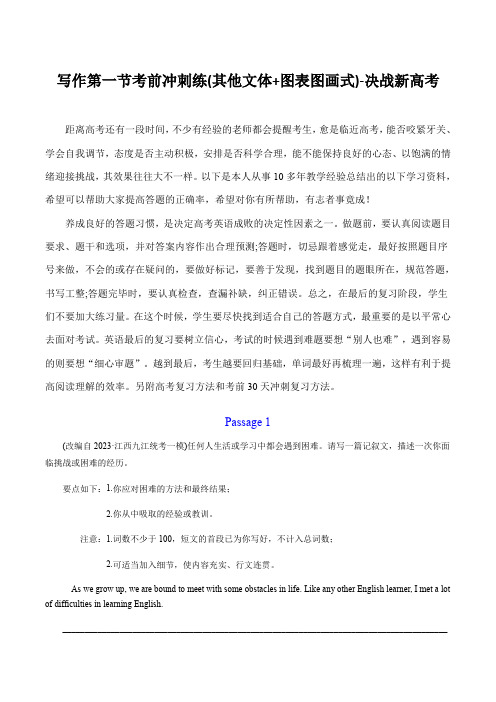
写作第一节考前冲刺练(其他文体+图表图画式)-决战新高考距离高考还有一段时间,不少有经验的老师都会提醒考生,愈是临近高考,能否咬紧牙关、学会自我调节,态度是否主动积极,安排是否科学合理,能不能保持良好的心态、以饱满的情绪迎接挑战,其效果往往大不一样。
以下是本人从事10多年教学经验总结出的以下学习资料,希望可以帮助大家提高答题的正确率,希望对你有所帮助,有志者事竟成!养成良好的答题习惯,是决定高考英语成败的决定性因素之一。
做题前,要认真阅读题目要求、题干和选项,并对答案内容作出合理预测;答题时,切忌跟着感觉走,最好按照题目序号来做,不会的或存在疑问的,要做好标记,要善于发现,找到题目的题眼所在,规范答题,书写工整;答题完毕时,要认真检查,查漏补缺,纠正错误。
总之,在最后的复习阶段,学生们不要加大练习量。
在这个时候,学生要尽快找到适合自己的答题方式,最重要的是以平常心去面对考试。
英语最后的复习要树立信心,考试的时候遇到难题要想“别人也难”,遇到容易的则要想“细心审题”。
越到最后,考生越要回归基础,单词最好再梳理一遍,这样有利于提高阅读理解的效率。
另附高考复习方法和考前30天冲刺复习方法。
Passage 1(改编自2023·江西九江统考一模)任何人生活或学习中都会遇到困难。
请写一篇记叙文,描述一次你面临挑战或困难的经历。
要点如下:1.你应对困难的方法和最终结果;2.你从中吸取的经验或教训。
注意:1.词数不少于100,短文的首段已为你写好,不计入总词数;2.可适当加入细节,使内容充实、行文连贯。
As we grow up, we are bound to meet with some obstacles in life. Like any other English learner, I met a lot of difficulties in learning English.____________________________________________________________________________________________________________________________________________________________________________________ ____________________________________________________________________________________________ ____________________________________________________________________________________________ __________________________________Passage 2(2023秋·广东潮州高三期末统考)假定你是李华,你要参加学校英语报以“Practice makes perfect”为题开展的征文活动。
高考英语冲刺导练高三全册英语试题5
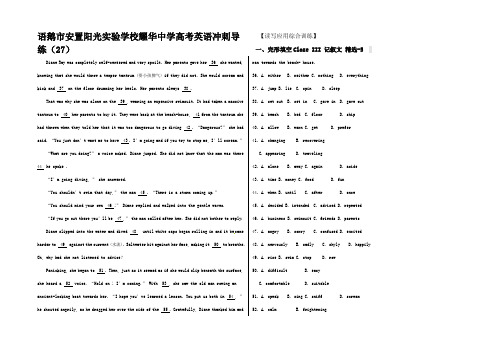
语鹅市安置阳光实验学校耀华中学高考英语冲刺导练(27)【读写应用综合训练】一、完形填空Cloze III 记叙文精选-5Diane Ray was completely self-centered and very spoilt. Her parents gave her 36 she wanted, knowing that she would throw a temper tantrum (耍小孩脾气) if they did not. She would scream and kick and 37 on the floor drumming her heels. Her parents always 38 .That was why she was alone on the 39 , wearing an expensive swimsuit. It had taken a massive tantrum to 40 her parents to buy it. They were back at the beach-house, 41 from the tantrum she had thrown when they told her that it was too dangerous to go diving 42 . “Dangerous?” she had said. “You just don’t want me to have 43 . I’m going and if you try to stop me, I’ll scream.”“What are you doing?” a voice asked. Diane jumped. She did not know that the man was there 44 he spoke .“I’m going diving, ” she answered.“You shouldn’t swim that day,” the man 45 . “There is a storm coming up.”“You should mind your own 46 !” Diane replied and walked into the gentle waves.“If you go out there you’ll be 47 ,” the man called after her. She did not bother to reply.Diane slipped into the water and dived 48 until white caps began rolling in and it be came harder to 49 against the current (水流). Saltwater hit against her face, making it 50 to breathe. Oh, why had she not listened to advice?Panicking, she began to 51 . Then, just as it seemed as if she would slip beneath the surface, she heard a 52 voice. “Hold on ! I’m coming.” With 53 , she saw the old man rowing an ancient-looking boat towards her. “I hope you’ve learned a lesson. You put us both in 54 , ” he shouted angrily, as he dragged her over the side of the 55 . Gratefully, Diane thanked him and ran towards the beach- house.36. A. either B. neither C. nothing D. everything37. A. jump B. lie C. spin D. sleep38. A. set out B. set in C. gave in D. gave out39. A. beach B. bed C. floor D. ship40. A. allow B. warn C. get D. prefer41. A. changing B. recoveringC. appearingD. traveling42. A. alone B. away C. again D. aside43. A. time B. money C. food D. fun44. A. when B. until C. after D. once45. A. decided B. intended C. advised D. repeated46. A. business B. swimsuit C. friends D. parents47. A. angry B. sorry C. confused D. excited48. A. nervously B. sadly C. shyly D. happily49. A. rise B. swim C. stop D. row50. A. difficult B. easyC. comfortableD. suitable51. A. speak B. sing C. sniff D. scream52. A. calm B. frighteningC. beautifulD. disgusting53. A. regret B. relief C. interest D. ease54. A. power B. safety C. danger D. thought55. A. house B. wave C. beach D. boat二、阅读理解Reading Comprehension█阅读微技能 Micro Reading Skills解析与训练系列 13微技能13:.理解逻辑关系Logical clues:高考阅读理解考查要求考生能理解具体的词、句、段乃至整篇不同层次的意义,并能把握全篇文脉,即句与句,段与段的关系,并能据此进行推理和判断。
高考英语冲刺导练高三全册英语试题_21
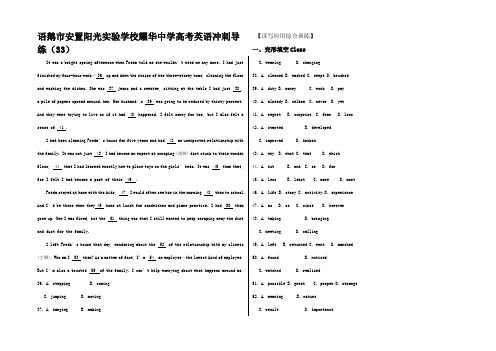
语鹅市安置阳光实验学校耀华中学高考英语冲刺导练(33)【读写应用综合训练】一、完形填空ClozeIt was a bright spring afternoon when Freda told me she wouldn’t need me any more. I had just finished my four-hour work —36 up and down the stairs of her three-storey home, cleaning the floor and washing the dishes. She was 37 jeans and a sweater, sitting at the table I had just 38 , a pile of papers spread around her. Her husband’s 39 was going to be reduced by thirty percent. And they were trying to live as if it had 40 happened. I felt sorry for her, but I also felt a sense of 41 .I had been cleaning Freda’s house for five years and had 42 an unexpected relationship with the family. It was not just 43 I had become an expert at scraping (刮掉) dirt stuck to their wooden floor, 44 that I had learned exactly how to place toys on the girls’ beds. It was 45 than that, for I felt I had become a part of their 46 .Freda stayed at home with the kids, 47 I would often see her in the morning 48 them to school. And I’d be there when they 49 home at lunch for sandwiches and piano practice. I had 50 them grow up. Now I was fired, but the 51 thing was that I still wanted to keep scraping away the dirt and dust for the family.I left Freda’s house that day, wondering about the 52 of the relationship with my clients (主顾). Who am I 53 them? As a matter of fact, I’m 54 an employee—the lowest kind of employee. But I’m also a trusted 55 of the family. I can’t help worrying about what happens around me.36. A. stepping B. comingC. jumpingD. moving37. A. hanging B. makingC. wearingD. changing38. A. cleaned B. washed C. swept D. brushed39. A. duty B. money C. work D. pay40. A. already B. seldom C. never D. yet41. A. regret B. surprise C. fear D. loss42. A. started B. developedC. improvedD. broken43. A. why B. what C. that D. which44. A. but B. and C. or D. for45. A. less B. least C. more D. most46. A. life B. story C. activity D. experience47. A. as B. so C. since D. however48. A. taking B. bringingC. meetingD. calling49. A. left B. returned C. went D. marched50. A. found B. noticedC. watchedD. realized51. A. possible B. great C. proper D. strange52. A. meaning B. natureC. resultD. importance53. A. for B. to C. with D .at54. A. hardly B. certainlyC. probablyD. merely 55. A. member B. personC. relativeD. companion二、阅读理解Reading Comprehension Test☑Reading Skills阅读理解能力■考查 2根据上下文推断生词、短语或句子的词义的含义[能力解析] 根据材料的背景及上下文线索推断词汇、短语在不同语境中的恰当含义或句子的准确意义;➢Passage AWhy play games? Because they are fun, and a lot more besides. Following the rules…planning your next move...acting as a team member…these are all “game” ideas that you will come across throughout your life.Think about some of the games you played as a young child, such as rope-jumping and hide-and-seek. Such games ar e entertaining and fun. But perhaps more importantly, they translate life into exciting dramas that teach children some of the basic rules they will be expected to follow the rest of their lives, such as taking turns and cooperating.Many children’s games have a practical side. Children around the world play games that prepare them for work they will do as grown-ups. For instance, some Saudi Arabian children play a game called bones. Which sharpens the hand-eye coordination (协调) needed in hunting.Many sports encourage national or local pride. The most famous games of all, the Olympic Games, bring athletes from around the world together to take part in friendly competition. People who watch the event wave flags, knowing that a gold medal is a win for an entire country, not just the athlete who earned it. For countries experiencing natural disasters or war, an Olympic win can mean so much.Sports are also an event that unites people. Soccer is the most popular sport in the world. People on all continents play it—some for fun and some for a living. Nicolette Iribarne, a Californian soccer player, has discovered a way to spread hope through soccer. He created a foundation to provide poor children with not only soccer balls but also a promising future.Next time you play your favorite game or sport, think about why you enjoy it, what skills are needed, and whether these skills will help you in other aspects of your life.41. Through playing hide-and-seek, children are expected to learn to ______.A. be a team leaderB. obey the basic rulesC. act as a grown-upD. predict possible danger42. The underlined part in Paragraph 2 most probably means that games can______.A. describe life in an exciting wayB. turn real-life experiences into a playC. make learning life skills more interestingD. change people’s views of sporting events43. According to the passage, why is winning Olympic medals so encouraging?A. It inspires people’s deep love for the country.B. It proves the exceptional skills of the winners.C. It helps the country out of natural disasters.D. It earns the winners fame and fortune.44. Iribarne’s goal of forming the foundation is to ______.A. bring fun to poor kidsB. provide soccer balls for childrenC. give poor kids a chance for a better lifeD. appeal to soccer players to help poor kids45. What can be inferred from the passage?A. Games benefit people all their lives.B. Sports can get all athletes together.C. People are advised to play games for fun.D. Sports increase a country’s competitiveness.➢Passage BFor many parents, raising a teenager is like fighting a long war, but years go by without any clear winner. Like a border conflict between neighboring countries, the parent-teen war is about boundaries: Where is the line between what I control and what you do?Both sides want peace, but neither feels it has any power to stop the conflict. In part, this is because neither is willing to admit any responsibility for starting it. From the parents’ point of view, the only cause of their fight is their adoles cents’ complete unreasonableness. And of course, the teens see it in exactly the same way, except oppositely. Both feel trapped.In this article, I’ll describe three no-win situations that commonly arise between teens and parents and then suggest some ways out of the trap. The first no-win situation is quarrels over unimportant things. Examples include the color of the teen’s hair, the cleanliness of the bedroom, the preferred style of clothing, the child’s failure to eat a good breakfast before school, or his tendency to sleep until noon on the weekends. Second, blaming. The goal of a blaming battle is to make the other admit that his bad attitude is the reason why everything goes wrong. Third, needing to be right. It doesn’t matter what the topic is—politics, the laws of physics, or the proper way to break an egg—the point of these arguments is to prove that you are right and the other person is wrong for both wish to be considered an authority—someone who actually knows something—and therefore to command respect.Unfortunately, as long as parents and teens continue to assume that they know more than the other, they’ll continue to fight these batt les forever and never make any real progress.55. Why does the author compare the parent-teen war to a border conflict?A. both can continue for generations.B. Both are about where to draw the line.C. Neither has any clear winner.D. Neither can be put to an end.56. What does the underlined part in Paragraph 2 mean?A. The teens blame their parents for starting the conflict.B. The teens agree with their parents on the cause of the conflict.C. The teens accuse their parents of misleading them.D. The teens tend to have a full understanding of their parents.57.Parents and teens want to be right because they want to ______.A. give orders to the otherB. know more than the otherC. gain respect from the otherD. get the other to behave properly58. What will the author most probably discuss in the paragraph that follows?A. causes for the parent-teen conflictsB. Examples of the parent-teen war.C. Solutions for the parent-teen problemsD. Future of the parent-teen relationship☑Hot topics 高考高频话题■话题2人物故事 Family, People & Life stories[话题解析]人物与故事类阅读为记叙文。
高考英语冲刺导练高三全册英语试题7
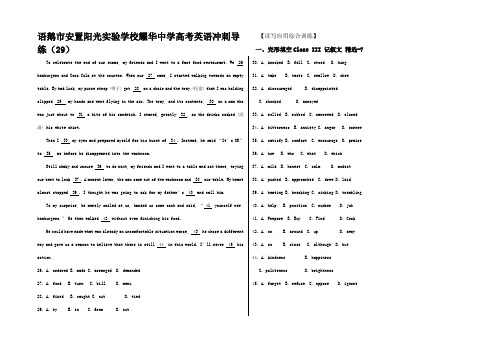
语鹅市安置阳光实验学校耀华中学高考英语冲刺导练(29)【读写应用综合训练】一、完形填空Cloze III 记叙文精选-7To celebrate the end of our exams, my friends and I went to a fast food restaurant. We 26 hamburgers and Coca Cola at the counter. When our 27 came, I started walking towards an empty table. By bad luck, my purse strap (带子) got 28 on a chair and the tray (托盘) that I was holding slipped 29 my hands and went flying in the air. The tray, and its contents, 30 on a man who was just about to 31 a bite of his sandwich. I stared, greatly 32 , as the drinks soaked (浸湿) his white shirt.Then I 33 my eyes and prepared myself for his burst of 34 . Instead, he said “It’s OK” to 35 me before he disappeared into the washroom.Still shaky and unsure 36 to do next, my friends and I went to a table and sat there, trying our best to look 37 . A moment later, the man came out of the washroom and 38 our table. My heart almost stopped 39 . I thought he was going to ask for my fa ther’s 40 and call him.To my surprise, he merely smiled at us, handed us some cash and said, “ 41 yourself new hamburgers.” He then walked 42 without even finishing his food.He could have made what was already an uncomfortable situation worse, 43 he chose a different way and gave us a reason to believe that there is still 44 in this world. I’ll never 45 his action.26. A. ordered B. made C. arranged D. demanded27. A. food B. turn C. bi ll D. menu28. A. fixed B. caught C. cut D. tied29. A. by B. in C. from D. out 30. A. knocked B. fell C. stood D. hung31. A. take B. taste C. swallow D. chew32. A. discouraged B. disappointedC. shockedD. annoyed33. A. rolled B. rubbed C. narrowed D. closed34. A. bitterness B. anxiety C. anger D. sorrow35. A. satisfy B. comfort C. encourage D. praise36. A. how B. who C. what D. which37. A. mild B. honest C. calm D. modest38. A. pushed B. approached C. drew D. laid39. A. beating B. breaking C. sinking D. trembling40. A. help B. position C. number D. job41. A. Prepare B. Buy C. Find D. Cook42. A. on B. around C. up D. away43. A. so B. since C. although D. but44. A. kindness B. happinessC. politenessD. brightness45. A. forget B. refuse C. oppose D. ignore二、阅读理解Reading Comprehension█阅读微技能 Micro Reading Skills解析与训练系列 15 ————————————The End (完结)微技能15:评价阅读内容Evaluation:作者在写作中不仅客观地叙述和说明,往往还持有某种态度,如对某观点赞同或反对,肯定或批评。
高考英语冲刺导练高三全册英语试题1_01
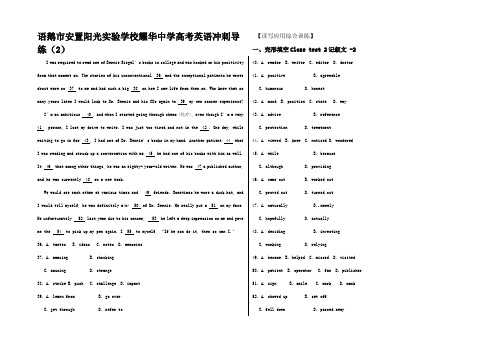
语鹅市安置阳光实验学校耀华中学高考英语冲刺导练(2)【读写应用综合训练】一、完形填空Cloze test 2记叙文 -2I was required to read one of Bernie Siegel’s books in college and was hooked on his positivity from that moment on. The stories of his unconventional 36 and the exceptional patients he wrote about were so 37 to me and had such a big 38 on how I saw life from then on. Who knew that so many years later I would look to Dr. Bernie and his CDs again to 39 my own cancer experience?I’m an ambitious 40 , and when I started going through chemo (化疗), even though I’m a very 41 person, I lost my drive to write. I was just too tired and not in the 42 . One day, while waiting to go in for 43 , I had one of Dr. Bernie’s books in my hand. Another patient 44 what I was reading and struck up a conversation with me 45 he had one of his books with him as well. It 46 that among other things, he was an eighty- year-old writer. He was 47 a published author, and he was currently 48 on a new book.We would see each other at various times and 49 friends. Sometimes he wore a duck hat, and I would tell myself, he was definitely a(n) 50 of Dr. Bernie. He really put a 51 on my face. He unfortunately 52 last year due to his cancer, 53 he left a deep impression on me and gave me the 54 to pick up my pen again. I 55 to myself, “If he can do it, then so can I.”36. A. tastes B. ideas C. notes D. memories37. A. amazing B. shockingC. amusingD. strange38. A. strike B. push C. challenge D. impact39. A. learn from B. go overC. get throughD. refer to 40. A. reader B. writer C. editor D. doctor41. A. positive B. agreeableC. humorousD. honest42. A. mood B. position C. state D. way43. A. advice B. referenceC. protectionD. treatment44. A. viewed B. knew C. noticed D. wondered45. A. while B. becauseC. althoughD. providing46. A. came out B. worked outC. proved outD. turned out47. A. naturally B. merelyC. hopefullyD. actually48. A. deciding B. investingC. workingD. relying49. A. became B. helped C. missed D. visited50. A. patient B. operator C. fan D. publisher51. A. sign B. smile C. mark D. mask52. A. showed up B. set offC. fell downD. passed away53. A. since B. but C. so D. for54. A. guidance B. trust C. opportunity D. inspiration55. A. promised B. swore C. thought D. replied二、【阅读理解】题型解析与训练Reading skill series 1《2015版高考天津卷·考试说明》阅读理解题型考查内容:1细节Supporting Details:具体信息;阐释主旨的细节事实;2指代关系References;3主旨与要义Main Ideas and the Central Point;4推断Inferences:推断词汇、句子意义;根据内容推理判断;5作者的写作意图、观点和态度Purpose and Tone & Fact and Opinion;6语篇:文章结构、上下文的逻辑关系Organization and contextual logic;文体特征和语言风格(文章出处、组织方式)Language style◆—1—推理判断 Inferences & Judgment据以推理的可能是词或句子,也可能是若干句,甚至全文,要想做出精确的推断,必须注意以下四点:1.根据问题,细心把握文章中的全部信息和信息的各个方面。
最热湖北黄冈中学高考英语冲刺导练(3)
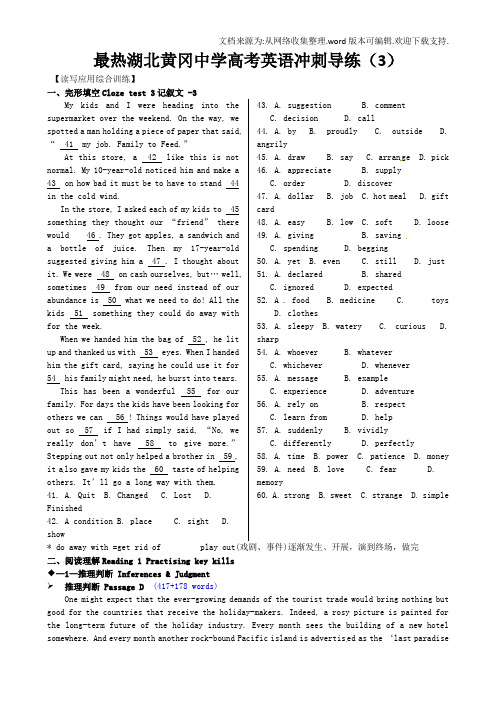
最热湖北黄冈中学高考英语冲刺导练(3)【读写应用综合训练】一、完形填空Cloze test 3记叙文 -3My kids and I were heading into the supermarket over the weekend. On the way, we spotted a man holding a piece of paper that said, “ 41 my job. Family to Feed.”At this store, a 42 like this is not normal. My 10-year-old noticed him and make a 43 on how bad it must be to have to stand 44 in the cold wind.In the store, I asked each of my kids to 45 something they thought our “friend” there would 46 . They got apples, a sandwich anda bottle of juice. Then my 17-year-old suggested giving him a 47 . I thought about it. We were 48 on cash ourselves, but… well, sometimes 49 from our need instead of our abundance is 50 what we need to do! All the kids 51 something they could do away withfor the week.When we handed him the bag of 52 , he litup and thanked us with 53 eyes. When I handed him the gift card, saying he could use it for 54 his family might need, he burst into tears.This has been a wonderful 55 for our family. For days the kids have been looking for others we can 56 ! Things would have played out so 57 if I had simply said, “No, we really don’t have 58 to give more.” Stepping out not only helped a brother in 59 ,it a lso gave my kids the 60 taste of helping others. It’ll go a long way with them.41. A. Quit B. Changed C. Lost D.Finished42. A condition B. place C. sight D. show 43. A. suggestion B. commentC. decisionD. call44. A. by B. proudly C. outside D. angrily45. A. draw B. say C. arran ge D. pick46. A. appreciate B. supplyC. orderD. discover47. A. dollar B. job C. hot meal D. gift card48. A. easy B. low C. soft D. loose49. A. giving B. savingC. spendingD. begging50. A. yet B. even C. still D. just51. A. declared B. sharedC. ignoredD. expected52. A . food B. medicine C. toysD. clothes53. A. sleepy B. watery C. curious D. sharp54. A. whoever B. whateverC. whicheverD. whenever55. A. message B. exampleC. experienceD. adventure56. A. rely on B. respectC. learn fromD. help57. A. suddenly B. vividlyC. differentlyD. perfectly58. A. time B. power C. patience D. money59. A. need B. love C. fear D. memory60. A. strong B. sweet C. strange D. simple* do away with =get rid of play out(戏剧、事件)逐渐发生、开展,演到终场,做完二、阅读理解Reading 1 Practising key kills◆—1—推理判断 Inferences & Judgment➢推理判断 Passage D (417+178 words)One might expect that the ever-growing demands of the tourist trade would bring nothing but good for the countries that receive the holiday-makers. Indeed, a rosy picture is painted for the long-term future of the holiday industry. Every month sees the building of a new hotel(天堂) on earth’.However, the scale and speed of this growth seem set to destroy the very things tourists want to enjoy. In those countries where there was a rush to make quick money out of sea-side holidays, over-crowded beaches and the concrete jungles of endless hotels have begun to lose their appeal.Those countries with little experience of tourism can suffer most. In recent years, Nepal set out to attract foreign visitors to fund developments in health and education. Its forests, full of wildlife and rare flowers, were offered to tourists as one more untouched paradise. In fact, the nature all too soon felt the effects of thousands of holiday-makers traveling through the forest land. Ancient tracks became major routes for the walkers, with the consequent exploitation of precious trees and plants.Not only the environment of a country can suffer from the sudden growth of tourism. The people as well rapidly feel its effects. Farmland makes way for hotels, roads and airports; the old way of life goes. The one-time farmer is now the servant of some multi-national organization; he is no longer his own master. Once it was his back that bore the pain; now it is his smile that is exploited. No doubt he wonders whether he wasn’t happier in his village working his own land.Thankfully, the tourist industry is waking up to the responsibilities it has towards those countries that receive its customers. The protection of wildlife and the creation of national parks go hand in hand with tourist development and in fact obtain financial support from tourist companies. At the same time, tourists are being encouraged to respect not only the countryside they visit but also its people.The way tourism is handled in the next ten years will decide its fate and that of the countries we all want to visit. Their needs and problems are more important than those of the tourist companies. Increased understanding in planning world-wide tourism can preserve the market for these companies. If not, in a few years’ time the very things that attract tourists now may well have been destroyed.71. What does the author indicate in the last sentence of Paragraph 1?A. The Pacific Island is a paradise.B. The Pacific Island is worth visiting.C. The advertisement is not convincing.D. The advertisement is not impressive72. The example of Nepal is used to suggest ______.A. its natural resources are untouchedB. its forests are exploited for farmlandC. it develops well in health and educationD. it suffers from the heavy flow of tourists73. What can we learn about the farmers from Paragraph 4?A. They are happy to work their own lands.B. They have to please the tourists for a living.C. They have to struggle for their indep endence.D. They are proud of working in multi-national organizations.74. Which of the following determines the future of tourism?A. The number of tourists.B. The improvement of services.C. The promotion of new products.D. The management of tourism.75.The author’s attitude towards the development of t he tourist industry is _______.A. optimisticB. doubtfulC. objectiveD. negative➢推理判断 Passage E (458+217 words)using the works of Shakespeare was discussing the role of Brutus in the death of Julius Caesar. “Brutus was not an honorable man,” he said. “He was a traitor (叛徒). And he murdered someone in cold blood.” The agreement was that Brutus had acted with cruelty when other options were available to him. He made a bad decision, they said—at least as it was presented by Shakespeare—to take the lead in murdering Julius Caesar. And though one of the executives acknowledged that Brutus had the good of the republic in mind, Caesar was nevertheless his superior. “You have to endeavor,” the executives said, “our policy is to obey the chain of command.”During the last few years, business executives and book writers looking for a new way to advise corporate America have been exploiting Shakespeare’s wisdom for prof itable ends. None more so than husband and wife team Kenneth and Carol Adelman, well-known advisers to the White House, who started up a training company called “Movers and Shakespeares”. They are amateur Shakespeare scholars and Shakespeare lovers, and they have combined their passion and their high level contacts into a management training business. They conduct between 30 and 40 workshops annually, focusing on half a dozen different plays, mostly for corporations, but also for government agencies.The workshops all take the same form, focusing on a single play as a kind of case study, and using individual scenes as specific lessons. In Julius Caesar, for example, sly provocation (狡诈的挑唆) of Brutus to take up arms against Caesar was the basis for a discussion of methods of team building and grass roots organising.Although neither of the Adelmans is academically trained in literature, the programmes contain plenty of Shakespeare tradition and background. Their workshop on Henry V, for example, includ es a helpful explanation of Henry’s winning strategy at the Battle of Agincourt. But they do come to the text with a few biases (偏见): their reading of Henry V minimises his misuse of power. Instead, they emphasize the story of the youth who seizes opportunity and becomes a masterful leader. And at the workshop on Caesar, Mr. Adelmans had little good to say about Brutus, saying “the noblest Roman of them all” couldn’t make his mind up about things.Many of the participants pointed to very specific elements in the play that they felt to be related. Caesar’s pride, which led to his murder, and Brutus’s mistakes in leading the traitors after the murder, they said, raise vital questions for anyone serving as a business when and how do you resist the boss?73. According to paragraph 1, what did all the executives think of Brutus?A. Cruel.B. Superior.C. Honorable.D. Rude74. According to the passage, the Adelmans set up “Movers and Shakespeares” to ______.A. help executives to understand Shakespeare’s plays betterB. give advice on leadership by analyzing Shakespeare’s playsC. provide case studies of Shakespeare’s plays in literature workshopsD. guide government agencies to follow the characters in Shakespeare’s plays.75. Why do the Adelmans conduct a workshop on Henry V?A. To highlight the importance of catching opportunities.B. To encourage masterful leaders to plan strategies to win.C. To illustrate the harm of prejudices in management.D. To warn executives against power misuse.76. It can be inferred from the passage that ______.A. the Adelmans’ programme proves biased as the roles of characters are maximized.B. executives feel bored with too many specific elements of Shakespeare’s plays.C. the Adelmans will make more profits if they are professional scholars.D. Shakespeare has played an important role in the management field.77. The best title for the passage is ______.A. Shakes peare’s plays: Executives reconsider corporate cultureB. Shakespeare’s plays: An essential key to business successC. Shakespeare’s plays: a lesson for business motivationD. Shakespeare’s plays: Dramatic training brings dramatic results➢推理判断 Passage F 2016 JS_C (594words)El Nin o, a Spanish term for “the Christ child”, was named by South American fisherman who noticed that the global weather pattern, which happens every two to seven years, reduced the amount of fishes caught around Christmas. El Nino sees warm water, collected over several years in the western Pacific, flow back eastwards when winds that normally blow westwards weaken, or sometimes the other way round.The weather effects, both good and bad, are felt in many places. Rich countries gain more from powerful Nino, on balance, than they lose. A study found that a strong Nino in 1997-98 helped America’s economy grow by $15 billion, partly because of better agricultural harvest, farmers in the Midwest gained from extra rain. The total rise in agricultural incomes in rich countries is greater than the fall in poor ones.But in Indonesia extremely dry forests are in flames. A multi-year drought (干旱) in south-east Brazil is becoming worse. Though heavy rains brought about by El Nino may relieve the drought in California, they are likely to cause surface flooding and other disasters.The most recent powerful Nino, in 1997-98, killed around 21,000 people and caused damage worth $36 billion around the globe. But such Ninos come with months of warning, and so much is known about how they happen that governments can prepare. According to the Overseas Development Institute (ODI), however, just 12% of disaster-relief funding in the past two decades has gone on reducing risks in advance, rather than recovery and rebuilding afterwards. This is despite evidence that a dollar spent on risk-reduction saves at least two on reconstruction.Simple improvements to infrastructure (基础设施) can reduce the spread of disease. Better sewers (下水道) make it less likely that heavy rain is followed by an outbreak of the disease of bad stomach. Stronger bridges mean villages are less likely to be left without food and medicine after floods. According to a paper in 2011 by Mr Hsiang and co-authors, civil conflict is relat ed to El Nino’s harmful effects—and the poorer the country, the stronger the link. Though the relationship may not be causal, helping divided communities to prepare for disasters would at least reduce the risk that those disasters are followed by killing and wounding people. Since the poorest are least likely to make up for their losses from disasters linked to El Nino, reducing their losses needs to be the priority.61. What can we learn about El Nino in Paragraph 1?A. It is named after a South American fisherman.B. It takes place almost every year all over the world.C. It forces fishermen to stop catching fish around Christmas.D. It sees the changes of water flow direction in the ocean.62. What may El Ninos bring about to the countries affected?A. Agricultural harvests in rich countries fall.B. Droughts become more harmful than floods.C. Rich countries’ gains are greater than their losses.D. Poor countries suffer less from droughts economically.63. The data provided by ODI in Paragraph 4 suggest that_______.A. more investment should go to risk reductionB. governments of poor countries need more aidC. victims of El Nino deserve more compensationD. recovery and reconstruction should come first64. What is the aut hor’s purpose in writing the passage?A. To introduce El Nino and its origin.B. To explain the consequences of El Nino.C. To show ways of fighting against El Nino.D. To urge people to prepare for El Nino.【语法重点复习导练】语法技能重点复习导练:句子2二、形容词性从句——定语从句-1:限定性从句与非限定性从句考查重点:形容词从句的引导词叫关系词(relative)。
高考英语冲刺导练30201704211108.doc
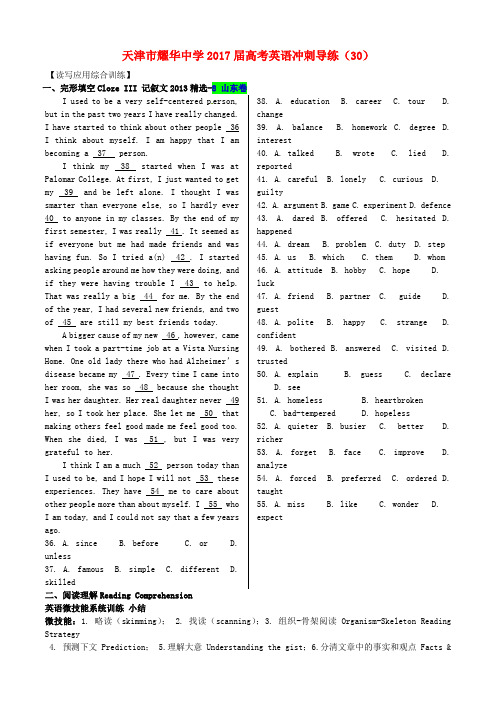
天津市耀华中学2017届高考英语冲刺导练(30)I used to be a very self-centered pbut in theI thinkIPalomarmy 39 and be left alone. I thought I was40 to anyone in my classes. By the end of my firstaskingof theof 45 are still my best friends today.AI was herWhen sheotherI amago.unless37. A.skilled 38. A. education B. career C. tour D. change39. A. balance B. homework C. degree D. interest40. A. talked B. wrote C. lied D. reported41. A. careful B. lonely C. curious D. guilty42. A. argument B. game C. experiment D. defence43. A. dared B. offered C. hesitated D. happened44. A. dream B. problem C. duty D. step45. A. us B. which C. them D. whom46. A. attitude B. hobby C. hope D. luck47. A. friend B. partner C. guide D. guest48. A. polite B. happy C. strange D. confident49. A. bothered B. answered C. visited D. trusted50. A. explain B. guess C. declareD. see51. A. homeless B. heartbrokenC. bad-temperedD. hopeless52. A. quieter B. busier C. better D. richer53. A. forget B. face C. improve D. analyze54. A. forced B. preferred C. ordered D. taught55. A. miss B. like C. wonder D. expect二、阅读理解Reading Comprehension英语微技能系统训练小结微技能:1. 略读(skimming); 2. 找读(scanning);3. 组织-骨架阅读Organism-Skeleton Reading Strategy4. 预测下文Prediction;5.理解大意Understanding the gist;6.分清文章中的事实和观点Facts &Opinions;7. 猜测词义Meaning Guessing;8.推理判断Inference; 9.了解重点细节Key Details;10. 理解文章结构Text Organization;11. 理解图表信息Diagrams;12.理解指代关系Reference;13.理解逻辑关系Logical clues;14.理解作者意图Purposes & Intentions;15.评价阅读内容Evaluation.阅读能力是由各种基于细节的、不同角度的理解综合构成的,平时的训练既注意细节的训练,又注意综合技能训练,同时,随着影响理解能力的词汇、语法、语篇等等层次的语言知识的积累和熟练,就能不断提升理解力,形成出色的阅读理解能力。
2022版新高考英语总复习提能练(二十三)-3-Life-in-the-future-含解析
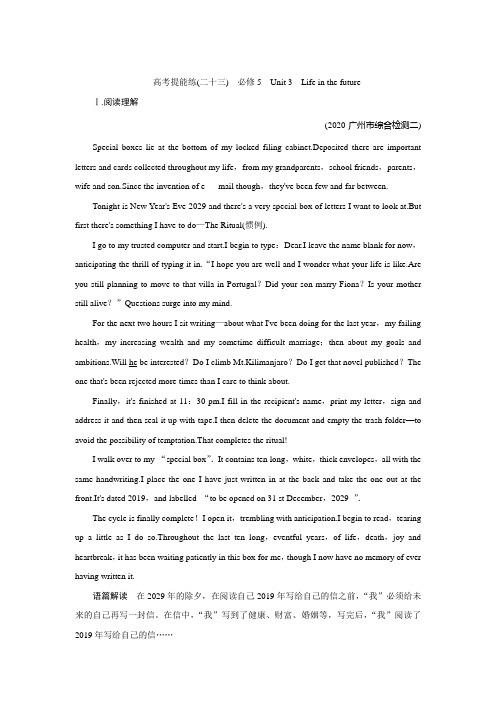
高考提能练(二十三)必修5Unit 3Life in the future Ⅰ.阅读理解(2020·广州市综合检测二) Special boxes lie at the bottom of my locked filing cabinet.Deposited there are important letters and cards collected throughout my life,from my grandparents,school friends,parents,wife and son.Since the invention of e mail though,they've been few and far between.Tonight is New Year's Eve 2029 and there's a very special box of letters I want to look at.But first there's something I have to do—The Ritual(惯例).I go to my trusted computer and start.I begin to type:Dear.I leave the name blank for now,anticipating the thrill of typing it in.“I hope you are well and I wonder what your life is like.Are you still planning to move to that villa in Portugal?Did your son marry Fiona?Is your mother still alive?”Questions surge into my mind.For the next two hours I sit writing—about what I've been doing for the last year,my failing health,my increasing wealth and my sometime difficult marriage;then about my goals and ambitions.Will he be interested?Do I climb Mt.Kilimanjaro?Do I get that novel published?The one that's been rejected more times than I care to think about.Finally,it's finished at 11:30 pm.I fill in the recipient's name,print my letter,sign and address it and then seal it up with tape.I then delete the document and empty the trash folder—to avoid the possibility of temptation.That completes the ritual!I walk over to my “special box”.It contains ten long,white,thick envelopes,all with the same handwriting.I place the one I have just written in at the back and take the one out at the front.It's dated 2019,and labelled “to be opened on 31 st December,2029 ”.The cycle is finally complete!I open it,trembling with anticipation.I begin to read,tearing up a little as I do so.Throughout the last ten long,eventful years,of life,death,joy and heartbreak,it has been waiting patiently in this box for me,though I now have no memory of ever having written it.语篇解读在2029年的除夕,在阅读自己2019年写给自己的信之前,“我”必须给未来的自己再写一封信。
- 1、下载文档前请自行甄别文档内容的完整性,平台不提供额外的编辑、内容补充、找答案等附加服务。
- 2、"仅部分预览"的文档,不可在线预览部分如存在完整性等问题,可反馈申请退款(可完整预览的文档不适用该条件!)。
- 3、如文档侵犯您的权益,请联系客服反馈,我们会尽快为您处理(人工客服工作时间:9:00-18:30)。
天津市耀华中学2017届高考英语冲刺导练(32)【读写应用综合训练】一、完形填空Cloze 1Roberta appeared on the stage. She took a deep breath and began to 16 . Now she was Portia, a strong–willed 17 in Shakespeare’s The Merchant of Venice. The theater was filled with people. She was speaking with a power she had never before experienced, the words flowing 18 from her.19 , Roberta had never acted in her life before the audition (选拔试演). She 20 being in front of other people. She was very 21 at school. She had never thought she was good enough at anything to 22 much attention. She stayed mostly to herself, making 23 friends. She had excellent grades, 24 she always thought that something was missing.Two weeks before the audition, Roberta’s mother had heard about it and 25 her to join in.“I can’t think of anyone else better suited to 26 the part. Remember all the plays you used to act out for us?”Her mother wouldn’t let the 27 drop. “You’re just a little scared. Everyone gets scared. You know you 28 do it. The trick is to look past the 29 to find the love of what you’re doing.’’So Roberta had made an appointment with the head of the Drama Club. She had read the play and found herself excited by the 30 of speaking such rich words. In secret she practiced Port ia’s part, 31 the lines by repeating them over and over. It wasn’t hard; she 32 every minute of it. Every time she spoke the words, she had a new 33 of the lines, as if Shakespeare had written Portia on many levels.On the day of the audition, she 34 two of Portia’s famous speeches for the auditors. When she had finished, the head of the Drama Club announced the 35 was hers.16. A. sing B. dance C. speak D. report17. A. member B. actress C. player D. character18. A. weakly B. rapidly C. smoothly D. slowly19. A. At first B. In fact C. After all D. In all20. A. hated B. enjoyed C. appreciated D. regretted21. A. honest B. shy C. polite D. patient22. A. avoid B. focus C. pay D. attract23. A. few B. a few C. several D. many24. A. or B. so C. for D. but25. A. forced B. requestedC. encouragedD. reminded26. A. accept B. play C. offer D. learn27. A. role B. matter C. interest D. grade28. A. can B. must C. may D. should29. A. anger B. pain C. sadness D. fear30. A. purpose B. way C. idea D. importance31. A. memorizing B. organizingC. checkingD. improving32. A. disliked B. loved C. expected D. bore33. A. consideration B. descriptionC. selectionD. understanding34. A. practiced B. plannedC. performedD. delivered35. A. part B. play C. speech D. position二、阅读理解Reading Comprehension Test☑Reading Skills阅读理解能力■考查 1理解、获取文中具体信息[能力解析] 用于阐释主旨的事实与细节,有些直接,有些则间接。
考查具体信息提及与否, 判断信息正误或各种Wh-问题相关的信息;➢Passage 1Our library offers different types of studying places and provides a good studying environment.ZonesThe library is divided into different zones. The upper floor is a quiet zone with over a thousand places for silent reading, and places where you can sit and work with your own computer. The reading places consist mostly of tables and chairs. The ground floor is the zone where you can talk. Here you can find sofas and armchairs for group work.ComputersYou can use your own computer to connect to the Wi-Fi specially prepared for notebook computers; you can also use library computers, which contain the most commonly used applications, such as Microsoft Office. They are situated in the area known as the Experimental Field on the ground floor. Group-study PlacesIf you want to discuss freely without disturbing others, you can book a study room or sit at a table on the ground floor. Some study rooms are for 2-3 people and others can hold up to 6-8 people. All rooms are marked on the library maps.There are 40 group-study rooms that must be booked via the website. To book, you need an active University account and a valid University card. You can use a room three hours per day, nine hours at most per week. Storage of Study MaterialThe l ibrary has lockers for students to store course literature. When you have obtained at least 40 credits(学分), you may rent a locker and pay 400 SEK for a year’s rental period. Rules to be followedMobile phone conversations are not permitted anywhere in the library. Keep your phone on silent as if you were in a lecture and exit the library if you need to receive calls. Please note that food and fruit are forbidden in the library, but you are allowed to have drinks and sweets with you.36. The library’s upper floor is mainly for students to _______.A. read in a quiet placeB. have group discussionsC. take comfortable seatsD. get their computers fixed37. Library computers on the ground floor _______.A. help students with their field experimentsB. contain software essential for schoolworkC. are for those who want to access the Wi-FiD. are mostly used for filling out application forms38. What condition should be met to book a group-study room?A. A group must consist of 8 people.B. Three-hour use per day is the minimum.C. One should first register at the university.D. Applicants must mark the room on the map.39. A student can rent a locker in the library if he ______.A. can afford the rental feeB. attends certain coursesC. has nowhere to put his booksD. has earned the required credits40. What should NOT be brought into the library?A. Mobile phonesB. Orange juice.C. Candy.D. Sandwiches.➢Passage 2 2016浙江卷DTwo things changed my life: my mother and a white plastic bike basket. I have thought long and hard about it and it’s true. I would be a different person if my mom hadn’t turned a silly bicycle accessory into a life lesson I carry with me today.My mother and father were united in their way of raising children, but it mostly fell to my mother to actually carry it out. Looking back, I honestly don’t know how she did it. Managing the family budget must have been a very hard task, but she made it look effortless. If we complained about not having what another kid did, we’d hear something like, “I don’tcare what so-and-so got for his birthday, you are not getting a TV in your room a car for your birthday a lavish sweet 16 party.” We had to earn our allowance by doing chores around the house. I can still remember how long it took to polish the legs of our coffee table. My brothers can no doubt remember hours spent cleaning the house. Like the two little girls growing up at the White House, we made our own beds (no one left the house until that was done) and picked up after ourselves. We had to keep track of our belongings, and if something was lost, it was not replaced.It was summer and, one day, my mother drove me to the bike shop to get a tire fixed— and there it was in the window, white, shiny, plastic and decorated with flowers, the basket winked at me and I knew—I knew—I had to have it.“It’s beautiful,” my mother said when I pointed it out to her,”What a neat basket.”I tried to hold off at first, I played it cool for a short while. But then I guess I couldn’t stand it any longer: “Mo m, please can I please, please get it? I’ll do extra chores for as long as you say, I’ll do anything, but I need that basket, I love that basket. Please, Mom. Please?”I was desperate.“You know,” she said, gently rubbing my back while we both stared at what I believe was the coolest thing ever,” If you save up you could buy this yourself.”“By the time I make enough it’ll b e gone!”“Maybe Roger here could hold it for you,” she smiled at Roger, the bike guy.“He can’t hold it for that long, Mom. Someone else will buy it. Please, Mom, Please?”“There might be another way,” she said.And so our paying plan unfolded. My mother bought the beautiful basket and put it safely in some hidi ng place I couldn’t find. Each week I eagerly counted my growing saving increased by extra work here and there (washing the car, helping my mother make dinner,delivering or collecting things on my bike thatalready looked naked without the basket infront). And then, weeks later, I counted,re-counted and jumped for joy. Oh ,happy day!I made it! I finally had the exact amount we’dagreed upon....Days later the unthinkable happened. A neighborhood girl I’d played with millions oftimes appeared with the exact same basket fixedto her shiny, new bike that already had all thebells and whistles. I rode hard and fast hometo tell my mother about this disaster. Thishorrible turn of events.And then came the lesson. I’ve taken withme through my life: “Honey, Yo ur basket isextra-special,” Mom said, gently wiping awaymy hot tears. “Your basket is special becauseyou paid for it yourself.”55. What can we learn from the first two paragraphs?A. The children enjoyed doing housework.B. The author came from s well-offfamilyC. The mother raised her children in anunusual wayD. The children were fond of the US president’s daughters.56. When the author saw the basket in the window,she ______.A. fell in love with itB. stared at hermother C. recognized it at once D. wentup to the bike guy57. Why did the author say many “please” toher mother?A. She longed to do extra work.B. She was eager to have the basket.C. She felt tired after standing too long.D. She wanted to be polite to her moth er.58. By using “naked” (Paragraph 12),theauthor seems to stress that the basket was______.A. something she could affordB. something important to herC. something impossible to getD. something she could do without59. To the author, it seemed to be a horrible turn of events that ______. A. something spoiled her paying plan B. the basket cost more than she had saved C. a neighborhood girl had bought a new bike D. someone else had got a basket of the same kind 60. What is the life lesson the author learned from her mother? A. Save money for a rainy day B. Good advice is beyond all price. C. Earn your bread with your sweat D. God helps those who help themselves ☑Hot topics 高考高频话题 ■话题1 学校教育 School Life & Education [话题解析] 学校和教育话题是高考阅读高频选材之一。
